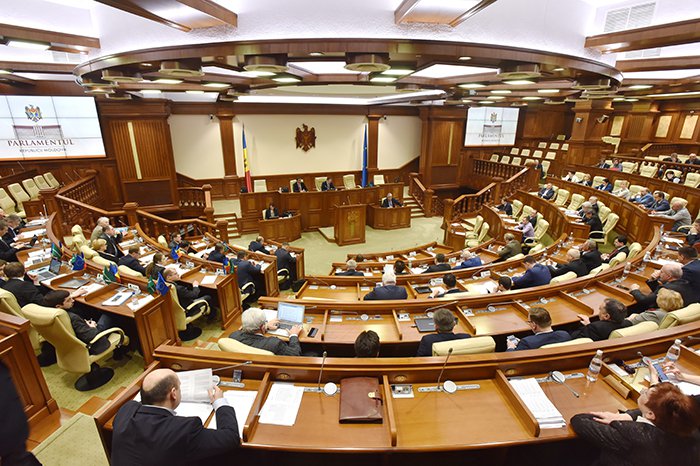
Draft law on uninominal voting system subject to public debates
Chisinau, 31 March /MOLDPRES/- The draft law on amending the Electoral Code and transition to the uninominal voting system of MPs was discussed within public debates organized by parliament today. Attending the talks were lawmakers, representatives of political parties, Central Election Commission, Justice Ministry, Constitutional Court, representatives of civil society and experts.
Under the document, it is set to form 101 voting districts, according to the territorial-demographic principles. “Preliminary registration will be organized for diaspora, and the districts will be formed according to the principle of proportional representation. Elections will be held in the region of the left bank of the Dniestre when the constitutional authorities can ensure holding democratic and fair elections. Citizens will vote people they know, which will allows independence of MPs”, Democratic MP Sergiu Sirbu said.
If the draft is approved, candidates will have to collect at least 1,000 signatures of constituency and criminal record of integrity. To accede the parliament, it is needed a majority of voters in the constituency. “A lawmaker could not be removed from office in the first or last year of mandate in order to exclude abuse. Revocation of MP will be through a local referendum, and the decision will be made by the accumulation of at least 50 per cent of the total number of voters, but not less than the number of votes gained by candidate”, Sirbu said.
CEC head Alina Russu noted that “legislative amendments would be made a year before parliamentary elections, as to be managed adjusting legal framework, training employees and logistics”.
Many political analysts opted for setting uninominal voting system. Expert Vitalie Andrievschi said that the modifications would radically change the political elite. “There are still uncertainties regarding the participation of citizens from the left bank of the Dniestre, ensuring proportional men and women among lawmakers, vote in diaspora, getting into parliament of responsible persons”, he said.
On the other hand, representatives of civil society and extraparliamentary parties criticized the draft and noted that it will not ensure the independence of elected MPs. AT the same time, they pointed out “it does not matter the electoral system, but holding elections, as a number of violations has been recorded in the previous elections”.
Expert Sergiu Tofilat said that after setting the uninominal system, “moneymen will be elected, who have an interest to protect their business. Withdrawal of the mandate is also something manipulative. At the same time, the uninominal system will not provide proportional representation in parliament. There are real problems to be solved, so I speak out against the new electoral system”, Tofilat said.
Political analyst Arcadie Barbarosie said that the problems would continue to be after adopting this system. “I am referring to financing parties and corruption of voters. At the same time, there is a risk to disappear parliamentary opposition”, he said.
For his part, representative of civil society Sergiu Ungureanu said that the draft had more gaps. “I mean the way of forming constituencies, diaspora representation in parliament and impairing of democracy, especially, the representatives of ethnic minorities. I think we have to improve the current system and then to move on to other options”, he said.
The draft law on amending the Electoral Code and transition to uninominal voting system of MPs was registered in parliament on 14 March 2017. The document was initiated by a group of lawmakers of the parliamentary majority and sent for expertise to the Venice Commission.
(Reporter A. Plitoc, editor L. Alcază)
Court of Appeal sides with Moldova's Central Electoral Commission: three parties affiliated with convict Ilan Shor have no right to participate in elections
Moldova's Central Electoral Commission receives documents, subscription lists submitted by potential independent candidate for parliamentary elections
Moldovan parliament to convene at special session on August 17 to appoint new Constitutional Court judges
Moldovan PM at Diaspora Congress says leadership's goal to build in Moldova model existing in EU
Over 2,600 citizens registered to vote by mail
Another two parties submit applications for registration in parliamentary election race in Moldova
Major irregularities in election campaign's financing; Moldovan Central Electoral Commission sends files to Anti-Corruption Prosecutor's Office
U.S. Department of State Human Rights Report: Moldovan government makes credible steps to identify, sanction officials who committed abuses
PHOTO GALLERY // Constitutional Court unveiled activity report for last six years
Moldova's Foreign Affairs Ministry responds to charges launched by spokeswoman of Russian competent ministry
Three new panels created within Judges' Evaluation Commission in Moldova
Meteorologists forecast yellow heat warning in Moldova for 22 August
Government spokesperson reacts to protest today
Austria's Foreign Minister: We actively support independence and resilience of Moldova
PHOTO GALLERY // Austrian Federal Minister for European and International Affairs visits Chișinău
DOC // Published in Official Journal: High school students and adults to be able to certify Romanian language skills through national test
Small entrepreneurs in agriculture can access up to 150,000 euros for investments
Moldovan Prime Minister to visit Leova district
EU & bunicii mei contest held in center of Moldova
Citizens invested about 648 million lei in government bonds over past year
Support guide at returning to Moldova updated, to assist citizens willing to come back home
Moldovan deputy PM participates in Moldova-Romania cross-border cooperation forum
Independence Day of Moldova marked at World Expo in Osaka
Moldovan students to be able to benefit from scholarships provided by Hungarian government
Moldovan government extends list of infrastructure development projects in Security Zone settlements


